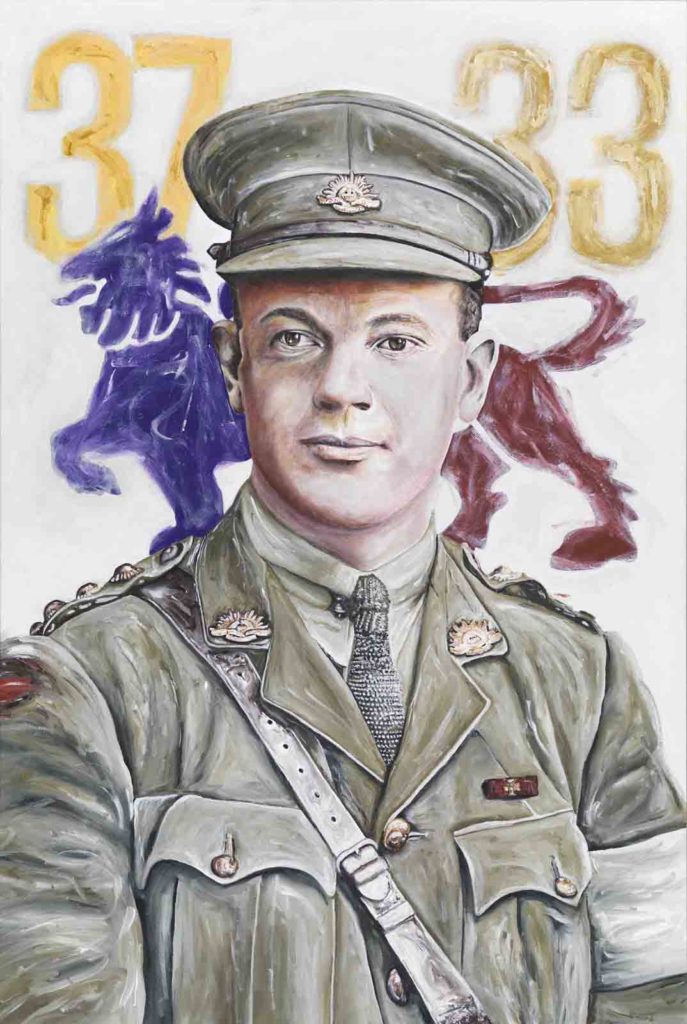Lieutenant Robert Cuthbert Grieve
Robert Cuthbert Grieve (1889-1957), soldier and businessman, was born on 19 June 1889 at Brighton, Melbourne, son of John Grieve, clerk and later warehouseman, and his wife Annie Deas, née Brown, both Victorian-born. Educated at Caulfield Grammar School and Wesley College, he became an interstate commercial traveller in the softgoods trade. On enlistment in the Australian Imperial Force on 16 June 1915, after nine months service in the Victorian Rangers, he was posted to the 37th Battalion. He was commissioned as a second lieutenant on 17 January 1916 and promoted lieutenant on 1 May; a month later the battalion embarked for training in England. When the 10th Light Trench Mortar Battery was organized there Grieve was seconded to it in January 1917 but on 19 April he rejoined the 37th Battalion in France, receiving his captaincy and the command of ‘A’ Company. The appointment was well received by his fellow soldiers who respected his quiet, understanding style of command.
The 37th Battalion took part in no major action, although its strength had been tested in several sharp raids, until the battle of Messines in June. Grieve was to receive the Victoria Cross for gallantry in this attack. Before the battle the unit made a detailed study of its role and Grieve ensured that his men were as fully informed as possible. On the night of 6 June the 37th began its approach march and soon suffered an intensive gas-attack. Just before dawn it reached its assembly trenches, moved about 11 a.m. towards its objective and came under heavy shell-fire; the resulting casualties, with those of the previous night, seriously depleted its strength.
In the afternoon of 7 June, Grieve’s company was in position on the battalion’s left flank. In front of its objective lay a thick band of wire and as the company ran through several gaps it came under intense fire from a German pillbox. An attempt to mortar this strong point was unsuccessful. Grieve, the only unwounded officer in ‘A’ Company, decided to attack the pillbox alone. Taking a supply of Mills bombs he dashed forward, taking cover wherever possible. His well-aimed grenades silenced some of the gunners, allowing him time to reach the nearby trench and bomb the rest of the machine-gun crew. His company was then able to advance and had scarcely gained its objective when a sniper’s bullet severely wounded Grieve in the shoulder. He was the first member of the 3rd Division to receive the Victoria Cross.
He was evacuated to England and returned to his unit on 29 October but soon afterwards suffered acute trench nephritis and double pneumonia and was invalided to Australia in May 1918. On 7 August, at Scots Church, Sydney, he married Sister May Isabel Bowman of the Australian Army Nursing Service who had nursed him during his illness. She died some years later and there were no children of the marriage. After demobilization Grieve established the business of Grieve, Gardner & Co., softgoods warehousemen, in Flinders Lane, Melbourne, and was managing director until 4 October 1957 when he died of cardiac failure; he had suffered from nephritis since 1917. He was buried with military honours in Springvale cemetery. He was a staunch supporter of Wesley College to which his Victoria Cross was presented in 1959.


